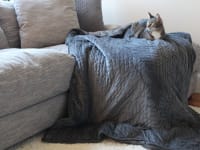Products are chosen independently by our editors. Purchases made through our links may earn us a commission.
Sleep is a personal process in more ways than one. We all do it a bit differently. As an example, some sleep with the thinnest of sheets even in the dead of winter, while others need the weight of a comforter even during the most sweltering of summer nights. It’s also personal because of what one wears to sleep, thus poses the question: should you wear pajamas or nothing but the radio?
Sleep Week 2024, or Sleep Awareness Week, is all about improving your sleep, be it what you wear or what products you’re resting your head on at night. So, we’re here to share what you should (or shouldn’t) be wearing to get the best night’s sleep possible. Here’s what to know.
What are the benefits of sleeping naked?
Regulating your nighttime temperature is one of the main benefits of sleeping naked, says Dr. Raj Dasgupta, an M.D. who specializes in sleep and pulmonology at USC's Keck Medicine, and spokesperson for the American Academy of Sleep Medicine.
“The whole concept behind [sleeping naked] is really a combination of comfort and keeping you on the cooler side,” Dasgupta says. “It may really be the [solution for] individuals who are very sensitive when it comes to temperature in the room,” he says.
The temperature preference largely correlates to circadian rhythm: ”When we lie down, we cool down,” he explains. “And when we get up, we warm up.” Of course, there are numerous ways to achieve (or echo) your body's nightly temperature drop—even taking a warm shower before bed could help, he says.
But one of the easiest and least expensive ways to keep yourself cool at night is to sleep naked. (You can also shop for sheets that help you keep cool, like the Casper Hyperlite Sheets, which are woven with tiny air-vents in the fabric that make them ultra breathable.)
Some claim that sleeping naked provides a confidence boost, but Dasgupta wouldn’t go that far. “I’m not gonna say that if you wanna go to med school, sleep naked and you’ll get through your classes,” he says.
Should you wear pajamas?
Pajamas are the other option, and they might be a no-brainer if you aren’t prone to overheating. Some may find the mere thought of sleeping naked raises stress levels—there are a number of Reddit threads devoted to questions surrounding the practice, including “People who sleep naked, when has it backfired?” You may be better off staying clothed if you fall into the camp of folks who fear robbers barging through the door or the fire alarm sounding and having to scramble to find clothes.
Stress can affect sleep, as uneasiness makes the body more alert. “That sort of feeling of being under threat impacts how deeply you sleep, because if you think about it, we're really not supposed to sleep deeply when we're under stress,” said Dr. Kelly Baron in an interview with the University of Utah’s Scope podcast.
Dasgupta agrees that trying to sleep naked can be counterproductive if it causes more stress than it’s worth. “You want to transition nicely to sleep.” That may include throwing on whatever clothing suits you. The general idea? “Looser clothing will be the way to go,” Dasgupta says.
Are there downsides to sleeping with pajamas?
Broadly speaking, there aren’t distinct disadvantages to sleeping with pajamas. Tight pajamas that constrict aren’t ideal—but finding yourself wound up in the fabric of a too-loose shirt could also disrupt your sleep. But it’s not something Dasgupta would be overly worried about, noting that you can simply pay attention to what’s happening on a nightly basis to see if it’s an issue.
If you opt for pajamas, considering fabric may prove helpful. While it all boils down to personal preference, some fabrics that are breathable, like cotton, may be more comfortable overnight. Dasgupta loves to sleep in “beat-up old concert T-shirts and maybe some boxers,” he says. “But you do what makes you feel most comfortable.”
For men who like cotton, we'd recommend the Men's Scotch Flannel Plaid pajamas from L.L. Bean. The cotton will be breathable—though flannel's known for being cozy, so this set is likely best lent to winter months or colder climates. You might also consider other materials such as lyocell and modal (trademarked as Tencel). The fiber is made from plant sources, often bamboo. Bamboo-based fibers, like the material of our favorite women's pajamas from Eberjey, are generally considered breathable and good at wicking—which might make them ideal for sleep.
Beyond that, there are a number of articles online that claim that vaginal health can be affected by wearing underwear overnight—namely, that it could cause yeast infections. The connection was most likely to tight fitting underwear that tend to trap a lot of moisture and sweat, according to Dasgupta. He noted that some OB-GYN doctors may ask about clothing if they see patients who are prone to recurring yeast infections, but he thinks it’s a stretch to equate the two. But talk with your primary care provider or OB-GYN if it's a concern.
What about sleeping naked and keeping your sheets clean?
Ideally you should wash your sheets every week or so. For those who wear pajamas, it could be construed as a flexible guideline. But if you’re sleeping in the nude, it might be another story. “I don't know if you want to be sleeping naked in your bed and changing your sheets like, you know, once a month—that sounds not too hygienic,” Dasgupta says.
Not to freak you out, but there may be another reason to keep your body under wraps: It seems like farting unclothed unleashes some gut bacteria. According to one admittedly unscientific test described by the National Center for Biotechnology Information, a scientist decided to get a colleague to fart into a petri dish—once with clothing, and another time without. (Don’t ask me how they did it.)
The petri dish corresponding to the clothed fart didn’t sprout anything. The other? It grew bacteria that are usually only found in the gut and on the skin. The scientist believes it was the result of “the sheer velocity of the fart, which blew skin bacteria from the cheeks and blasted it onto the dish. It seems, therefore, that flatus can cause [transmission of bacteria] if the emitter is naked.” It’s no surprise that you may be unknowingly passing gas as you snooze.
Granted, these are almost certainly harmless bacteria, but it gets you thinking. At the very least, if you’re sleeping naked, it might be worthwhile to follow a regular laundering schedule.
You also shed skin and sweat overnight. Even that eye gunk you wake up with is a mix of “mucus, exfoliated skin cells, oils, and tears produced or shed by the eye during sleep,” according to the University of Utah Health.
Long story short? It’s important to regularly toss your sheets into the washing machine no matter your clothing situation. But sleeping naked, you’re likely shedding all sorts of other stuff that’s not stopped by pajamas. These things won’t kill you, but not washing your bedding enough could have an impact on your skin and allergies (if you have them).
Is it better to sleep naked?
As you've probably concluded, the answer is: It depends. Whether or not you should sleep naked will vary based on your preferences and what feels best to you at night. If sleeping naked feels too drastic, but you’re frequently overheating, maybe an oversized T-shirt and pair of boxer briefs or shorts will fill the bill. You may want to give your bed sheets a second look, too. Whatever helps you fall asleep—and slumber throughout the night—is the best bet.
But if you do decide to give it a try? “You may want to take a shower,” Dasgupta suggests.



